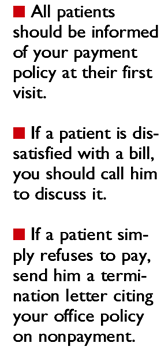Article
Malpractice Consult
When a patient won't pay
Q. We have a patient who refuses to pay our bills although we've made every effort to collect them. How far can we go in trying to collect? And under what circumstances is it ethical-or legal-to discharge the patient for nonpayment? Isn't there some point at which we should draw the line?

By law, the agreement to treat a patient is an implied contract between you and the patient. You agree to provide appropriate treatment, and the patient agrees to pay your fees. Either party can terminate the contract with no reason required.
If a patient doesn't pay your bill after repeated efforts to collect it, you or your staff should call him and attempt to discuss the matter. If he's indigent, you can refer him to a free clinic. If you're not covered by the patient's health plan, you can refer him to another doctor who is. If he has cash flow problems, perhaps a payment plan can be arranged. But if he simply refuses to pay, you should send him a termination letter citing your office policy on nonpayment.
In all these situations, however, you must continue to provide treatment for an appropriate period-typically 30 days from the date of termination-or until the patient finds another physician. Otherwise you could face a claim for abandonment.
Before turning the bill over to a collection agency or filing a lawsuit, consider the possible effects of such a step. To a patient who may already be unhappy with his treatment, receiving a dunning letter or being sued for nonpayment could prompt him to think about suing you for malpractice. If he does, your cost to fight the suit-in time, energy, and money-will most likely be far greater that the amount of the unpaid bill.
If you're faced with such a situation, review your records on this patient carefully, and ask yourself if there's any possible allegation of negligence on your part that could be supported by the evidence in the chart. If the answer is "yes," it might be wiser and safer to waive the bill instead of resorting to a collection agency or a lawsuit.
Realize that, if the case comes to trial, the patient's lawyer will probably argue that you wouldn't have waived the bill if you weren't at fault. Your attorney will counter by arguing that you did it out of kindness, to assuage an unhappy patient. In fact, waiving the disputed bill is neither an admission of guilt nor an exoneration. If you do waive it, however, first discuss the matter with your insurance carrier, and make sure you use language that does not admit any liability.

The author, who can be contacted at lj@bestweb.net
, is a healthcare attorney in Mt. Kisco, NY, specializing in risk management issues.
This department deals with questions on common professional liability issues. We cannot, however, offer specific legal advice. If you have a general question or a topic you'd like to see covered here, please send it to Malpractice Consult, Medical Economics, 5 Paragon Drive, Montvale, NJ 07645-1742. You may also fax your question to us at 973-847-5390 or e-mail it to memalp@advanstar.com
.





